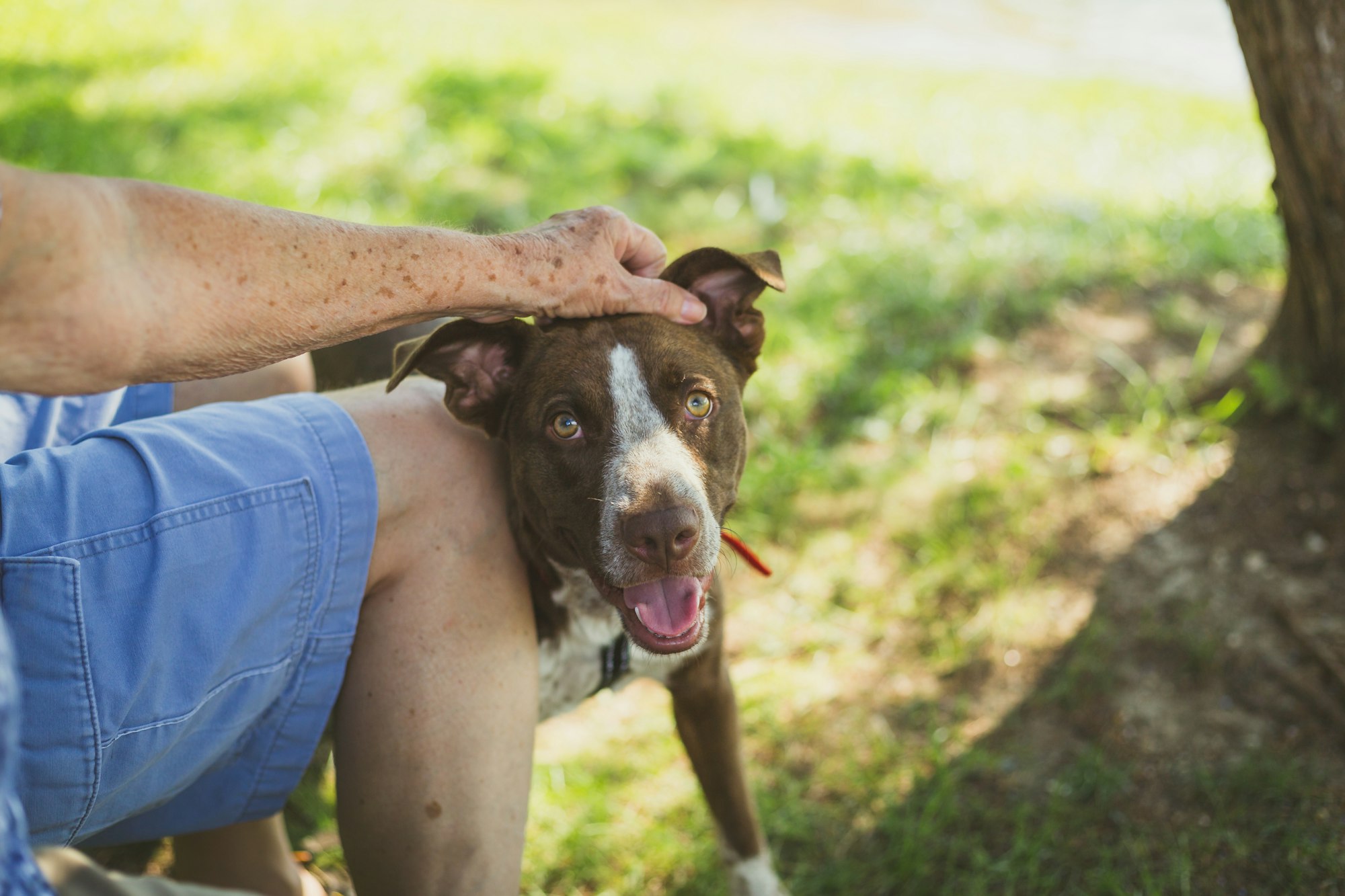Welcoming a rescue dog into your home is an act of kindness that opens the door to a fulfilling journey of companionship and mutual growth. These dogs, often with stories of resilience, bring a unique blend of challenges and rewards to their new families. This guide is designed to navigate the transition, offering insights into the essential preparations, training, and care needed to ensure a smooth integration for your new furry friend. From creating a comforting environment to understanding their past traumas, we'll cover the key aspects that every new rescue dog owner should know to foster a loving and supportive home.

Key takeaways:
- Creating a safe space: When bringing a rescue dog home, it's important to create a safe and comfortable environment where they can feel secure and relax.
- Training and socialization: Invest time in training your rescue dog, building trust, and establishing boundaries. Socializing them with humans and other animals will help them become well-adjusted and happy members of the family.
- Providing proper care: Take care of your rescue dog's basic needs by ensuring a balanced diet, regular exercise, grooming, hygiene, and regular veterinary check-ups. This will contribute to their overall well-being and happiness.
Training and Socializing a Rescue Dog:
Rescue dogs often require training and socialization to help them adjust to their new environment and form positive relationships. Building trust and establishing boundaries are vital aspects of training, along with obedience training and socialization with both humans and other animals.

Understanding and Managing Behavioral Issues:
It is not uncommon for rescue dogs to exhibit behavioral issues due to their past experiences. Separation anxiety, fearfulness, aggression, and resource guarding are some potential challenges that may arise. Understanding these issues and working with a professional trainer or behaviorist can help manage and overcome them.
Providing Proper Care for a Rescue Dog:
Proper care involves meeting a rescue dog's basic needs such as regular feeding and exercise, grooming and hygiene practices, and scheduling regular veterinary check-ups to ensure their health and well-being.
The Importance of Patience and Consistency:
Patience and consistency are essential when welcoming a rescue dog into your home. It takes time for them to adjust and develop trust. Consistent routines, positive reinforcement, and lots of love are key to helping a rescue dog feel safe and secure in their new environment.
By following these tips and providing a loving and supportive home, you can give a rescue dog a fresh start and build a lifelong bond filled with love and happiness.
Benefits of Adopting a Rescue Dog
There are numerous benefits of adopting a rescue dog that can greatly impact not only the dog's life but also yours. By adopting a rescue dog, you have the opportunity to save a life and give them a second chance at life, providing them with a loving home. Rescue dogs are often grateful for the love and care they receive, allowing you to form a special bond based on trust and loyalty, experiencing their unconditional love. Additionally, many rescue dogs go through thorough health screenings and medical treatments before adoption, ensuring they are in good health, which can result in healthier pets.
Furthermore, many rescue dogs are already trained or have basic obedience skills, making it easier to integrate them into your home and family. The act of caring for a rescue dog can also have a positive impact on your mental health, bringing a sense of purpose, reducing stress, and providing companionship, ultimately improving your overall well-being. So, consider the numerous benefits of adopting a rescue dog and make a positive change in both their life and yours.
Preparing Your Home for a Rescue Dog
Preparing your home for a rescue dog is an exciting and crucial step in providing them with a welcoming environment. In this section, we'll explore two key aspects: creating a safe space and purchasing essential supplies. Discover how to transform your home into a haven for your new furry friend, ensuring their comfort and security. From setting up designated areas to stocking up on the necessary supplies, we'll provide practical tips to make the transition smooth and delightful for both you and your rescue dog.
Creating a Safe Space
Creating a safe space for your rescue dog is of utmost importance in ensuring their sense of security and comfort within their new surroundings. To accomplish this, follow these steps:
- Designate a serene and secluded area within your home where your dog can retreat to whenever they are feeling overwhelmed.
- Offer a secure chew toy to keep them engaged and ease any feelings of anxiety or stress.
- Establish an organized environment by removing any potential hazards or sources of danger.
Pro-tip: Once your dog feels at ease in their safe space, gradually introduce them to various areas of your house. By doing so, they can adjust at their own pace and feel even more secure in their new surroundings.
Purchasing Essential Supplies
When preparing your home for a rescue dog, it is crucial to purchase essential supplies. Here are some items to consider when buying supplies for your new furry friend:
- Food bowl: It is recommended to choose a sturdy, non-slip bowl for meals to ensure your dog can eat comfortably.
- Durable toys: Providing interactive dog toys that can withstand rough play and chewing is important to keep your dog entertained and satisfied.
- Crate: Crate training is highly beneficial for both housebreaking and creating a safe space for your dog.
By acquiring these essential supplies, you are providing your rescue dog with everything they need for a smooth transition and a comfortable environment.

Training and Socializing a Rescue Dog
Training and socializing a rescue dog is crucial for their overall well-being and integration into a loving home. In this section, we will dive into the key aspects of this process. From building trust and establishing boundaries to obedience training, we'll explore effective techniques.
We'll discuss the importance of socialization with both humans and other animals, as well as how to understand and manage behavioral issues that may arise. Get ready to unlock the full potential of your four-legged friend!
Building Trust and Establishing Boundaries
Building trust and establishing boundaries are essential when adopting a rescue dog. Commence by creating a secure environment with a peaceful spot and a safe chew toy. Slowly introduce the dog to unfamiliar settings, individuals, and other animals to aid in socialization. Seek the assistance of a professional dog trainer to ensure obedience training and address any undesirable behaviors.
Understand and manage behavioral problems, including separation anxiety and resource guarding. Provide proper care by offering high-quality meals, maintaining a consistent exercise schedule, grooming, and regular veterinary check-ups. Patience and consistency are crucial in forming positive habits and a strong bond with your rescued dog.
Fun Fact: Rescue dogs have undergone training to detect cancer, seizures, and diabetic emergencies.
Obedience Training
Obedience training is a crucial aspect when welcoming a rescue dog into your home. Here are a few important steps to follow:
- Developing a strong bond: Dedicate quality time to your rescue dog, building trust and developing a solid bond.
- Establishing boundaries: Clearly define rules and boundaries to establish a consistent routine and structure.
- Teaching essential commands: Begin with basic commands such as sit, stay, and come. Utilize positive reinforcement techniques like treats and praise.
- Training on a leash: Train your dog to calmly walk on a leash, employing positive reinforcement and reward-based methods.
- Socializing your dog: Introduce your rescue dog to diverse people, animals, and environments to help them adapt to various situations.
- Addressing behavioral issues: If your dog exhibits undesirable behaviors, seek assistance from a professional dog trainer or behaviorist.
Consistency, patience, and positive reinforcement play a vital role in obedience training. With dedication and time, your rescue dog will learn to follow commands and become a well-behaved member of your family.
Socialization with Humans and Other Animals
When adopting a rescue dog, it is important to prioritize socialization with humans and other animals to ensure their development and well-being. Gradually introducing them to different individuals and creating positive experiences will help establish trust and foster healthy relationships. It is crucial to supervise these interactions and provide ample opportunities for them to engage with both people and animals.
By closely observing their body language, any negative encounters can be prevented through timely intervention. Keep in mind that each dog is unique and their socialization needs may differ. Through patience, consistency, and appropriate socialization, rescue dogs can overcome their previous traumas and transform into affectionate and well-adjusted companions.
Fact: The process of socialization significantly contributes to reducing anxiety and fearfulness in rescue dogs, thereby increasing their chances of finding permanent homes.
Understanding and Managing Behavioral Issues
Understanding and managing behavioral issues is of utmost importance when adopting a rescue dog. It is crucial to build trust and establish boundaries in order to create a safe and comfortable environment. Obedience training plays a vital role in addressing unwanted behaviors, while socialization with humans and other animals promotes positive interactions.
Patience and consistency are key in understanding and managing issues such as separation anxiety, fearfulness and aggression, and resource guarding. To ensure the overall well-being of the rescue dog, it is essential to provide proper care through feeding, exercise, grooming, hygiene, and regular veterinary check-ups. By following these guidelines and seeking professional help if necessary, you can assist your rescue dog in overcoming behavioral challenges and thriving in their new home.

Providing Proper Care for a Rescue Dog
Adopting a rescue dog comes with a unique set of responsibilities. In this section, we'll explore how to provide proper care for your new furry friend. From ensuring they receive the right nutrition and exercise in the Feeding and Exercise sub-section, to maintaining their hygiene and grooming needs, we've got you covered. Plus, we'll discuss the importance of regular veterinary check-ups to keep your rescue dog in tip-top shape. Let's dive in and discover how you can be the best caregiver for your beloved rescue dog!
Feeding and Exercise
Feeding and exercise are essential aspects of taking care of a rescue dog. Here are some tips to ensure their well-being:
- Select a high-quality and balanced diet to provide the necessary nutrients.
- Establish a feeding schedule and adhere to it to establish a routine and prevent overfeeding.
- Offer regular exercise to maintain physical and mental stimulation.
- Participate in interactive playtime and provide durable toys to keep them active and entertained.
- Take into account their age, breed, and energy levels when determining the appropriate amount of exercise.
- Keep track of their weight to ensure they maintain a healthy body condition.
- Consult a veterinarian for any specific dietary or exercise needs, especially for dogs with health conditions or special requirements.
Grooming and Hygiene
Grooming and hygiene are vital aspects of providing proper care for a rescue dog. Here are some helpful tips to ensure that your happy dog remains clean and healthy:
- Grooming: It is important to regularly groom your dog by bathing them with a dog shampoo for sensitive skin specifically designed for dogs. Use warm water and be cautious not to get water in their ears.
- Hygiene: Proper hygiene includes brushing your dog's coat on a regular basis to eliminate loose hair and prevent matting. Make sure to use a suitable brush for their specific coat type.
- Dental care: Take care of your dog's teeth by brushing them regularly using a toothbrush and toothpaste that is safe for dogs. This practice helps prevent dental issues and keeps their breath fresh.
- Nail trimming: To avoid overgrowth, make sure to trim your dog's nails frequently. If you are not confident in doing this yourself, seek professional assistance.
- Ear cleaning: Prevent ear infections by regularly cleaning your dog's ears with an ear cleaner recommended by a veterinarian. Avoid inserting anything too deep into the ear canal.
After welcoming a rescue dog named Lucy, her new owner diligently maintained her grooming and hygiene routine. Lucy's soft coat and fresh breath became the envy of the dog park. Thanks to consistent care, Lucy not only looked her best but also enjoyed a healthier and happier life.
Regular Veterinary Check-ups
Regular veterinary check-ups are essential for maintaining the overall health and well-being of your rescue dog. These check-ups are crucial as they allow veterinarians to identify any underlying health issues early on and administer the necessary treatment.
During these visits, the vet will perform a comprehensive examination, provide vaccinations, and implement preventive measures such as deworming and flea control. The regular check-ups also provide an excellent opportunity to discuss any behavioral concerns or questions you may have.
It's important to remember that prevention is the key, and these check-ups play a significant role in ensuring that your rescue dog receives the best possible care. To guarantee ongoing support and guidance, make sure to stay up-to-date with your dog's vaccinations and establish a good rapport with your veterinarian.

Conclusion:
In conclusion, welcoming a rescue dog into your home is a rewarding journey that extends beyond mere companionship to encompass mutual growth, healing, and the joy of second chances. By creating a safe and nurturing environment, investing in training and socialization, and providing diligent care, you lay the foundation for a fulfilling relationship with your new furry friend. The key to success lies in patience, consistency, and an understanding of the unique challenges and needs that rescue dogs may bring.
Embrace this opportunity to make a positive impact on a rescue dog's life while enriching your own with their unwavering love and gratitude. Remember, adopting a rescue dog is not just about saving a life; it's about completing your home with a loyal companion who has a lot of love to give. As you embark on this heartwarming journey, cherish every moment, learn from each challenge, and celebrate the beautiful bond that blossoms between you and your rescue dog.
Frequently Asked Questions
- 1. What should I consider before bringing home a rescue dog?
- Before bringing home a rescue dog, it's important to consider their background and any potential behavioral or health issues they may have. Ensure you have a safe and dog-proof area for them, a crate for crate training, and establish clear household rules.
- 2. How can I help my new rescue dog adjust to their new home?
- To help your new rescue dog adjust to their new home, create a quiet place for them to relax, establish a regular schedule for feeding and walking, and give them time and space to explore their surroundings at their own pace. Patience and a calm environment are key.
- 3. How can I potty train my rescue dog?
- To potty train your rescue dog, use positive reinforcement and consistent commands. Take them to their designated toileting area immediately upon arrival and reward them when they eliminate in the correct spot. Supervise them closely and take frequent trips outside until they learn the routine.
- 4. Can a positive enrichment dog trainer help with my rescue dog's behavior?
- Yes, a positive enrichment dog trainer can be beneficial for your rescue dog. They can provide stimulation, build confidence, and improve behavior through positive training methods. Choosing a trainer with experience in working with rescue dogs can further enhance the training process.
- 5. How can I introduce my rescue dog to my resident dogs?
- Introducing your rescue dog to your resident dogs should be done gradually and in a step-by-step process. Start with a neutral territory, such as a park, and observe their interactions. Supervise the initial meetings closely and provide positive reinforcement for good behavior. Seek guidance from an animal behaviorist if needed.
- 6. What should I do if my rescue dog has poor encounters with strangers?
- If your rescue dog has poor encounters with strangers, it's important to prioritize their safety and comfort. Allow them time to build trust and a mutual understanding. Gradually introduce them to new people in controlled environments, providing positive experiences and rewards. Consult with an animal behaviorist for specific guidance tailored to your dog's needs.